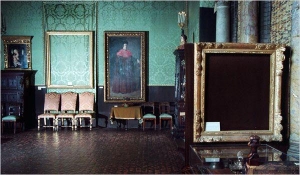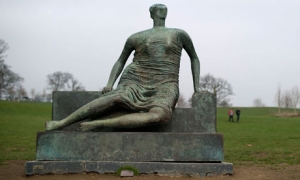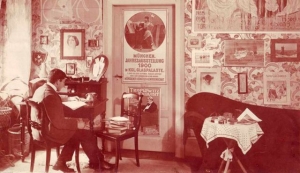|
Displaying items by tag: government
The Toledo Museum of Art in Ohio returned a ceramic water vase, which depicts the Greek god, Dionysus turning pirates into dolphins, to the Italian government on Tuesday, January 9, 2013. The jug, which dates back to the sixth century BC, was likely looted from Italian soil years ago.
The Toledo Museum of Art purchased the jug in 1982 from art dealers who used falsified documents to hide the object’s dishonest past. Investigators revealed that the jug was smuggled out of Italy after it was illegally excavate sometime before 1981.
The United States Immigration and Customs Enforcement Agency announced that the Estruscan black-figure kalpis, which is valued at $665,000, was handed back to Italian officials following a ceremony held at the museum. While Italy currently holds reign over the work, the jug will remain on view in the museum’s Libbey Court until it leaves for Rome in late summer of this year.
A vintage print of a photograph by Edvard Munch (1863-1944), which is now in the collection of the Munch Museum in Oslo, might be headed to the Centre Pompidou in Paris. One of an edition of five, the photograph shows Munch in his garden around 1930. The work was part of the collection that Munch bequeathed to the city of Oslo.
Last month, the city’s government asked Oslo’s parliament to approve the deaccession of the photograph so that it could be sold to a major international institution and made more accessible to the public. In response to the proposal, a member of Parliament pointed out that the deaccession is in contrast to Munch’s will that states that his works should be kept together. While a long-term loan is a possibility, city officials are asking Parliament to vote on the Munch sale.
The Centre Pompidou has offered nearly $50,000 for the print. The Oslo government expects a decision to be made in 2013.

Known for her extravagant shoe collection, one-time Philippine first lady, Imelda Marcos, also accrued an admirable art collection during her late husband’s reign. Marcos’ former secretary, Vilma Bautisa, was indicted on Tuesday, November 20th, on charges of conspiracy, tax fraud, and offering a false instrument for filing, all relating to artworks that had previously belonged to Marcos. 74-year-old Bautista acquired a number of important paintings from Marcos and her husband, Ferdinand, after his regime came crashing down in 1986 after a citizen revolt.
The Manhattan District Attorney hit Bautista, a New York resident, with charges that she was conspiring to sell paintings that were the legal property of the Philippine government. The District Attorney’s office claims that Bautista used false paperwork to sell Le Bassin aux Nymphéas (1899) from Claude Monet’s Water Lilies series in September 2010 for $32 million. The other works in Bautista’s possession are Monet’s L’Eglise et La Seine a Vétheuil (1881), Alfred Sisley’s Langland Bay (1887), and Albert Marquet’s Le Cypres de Djenan Sidi Said (1946). The four paintings involved in the suit once hung in a Manhattan town house used by Imelda Marcos and her husband.
Two of Bautista’s nephews were also charged but did not appear in court. Bautista pleaded not guilty and was released on a $175,000 bond.

In March of 1990, two thieves posing as Boston police officers entered the Isabella Stewart Gardner Museum and stole thirteen works of art including masterpieces by Vermeer, Rembrandt, Edgar Degas, and Edouard Manet. Now known as the greatest art heist in history, the case has remained unresolved despite the countless hours of investigating the FBI has conducted. While the Bureau has offered immunity to anyone who assisted in the recovery of the artworks, they have never received a concrete lead.
While it would appear that the reputed organized crime figure, Robert V. Gentile, who found himself in federal court this Wednesday on drug trafficking and gun possession was irrelevant to the Gardner case, the FBI believed Gentile had vital information to share. Gentile, 76, of Manchester, Connecticut, helped federal authorities for 10 months prior to his arrest but none of the information was useful in tracking down the thieves. Gentile’s lawyer claims that his client did know some of the individuals the government believed were involved in the heist, but that most of them were dead by now. Gentile now faces a maximum of 150 years in prison if he is convicted. The government is willing to negotiate his sentence so that his prison term will be reduced to 46-57 months.
Gentile became involved in the Gardner case when Elene Guarente, the widow of Robert Guarente, a mob associated who died in 2005, told investigators that her husband gave Gentile a painting that he had kept in a tube since the 1990s.

Although major figures in the British art world including Tate director Nicholas Serota, filmmaker Danny Boyle, and artist Jeremy Deller have voiced their opposition, the council of the Borough of Tower Hamlets in London’s East End decided on Wednesday to sell Henry Moore’s Draped Seated Woman. In addition to the big name opponents, more than 1,500 signed a petition against the sale in just a few days.
Completed in 1957, Moore sold the bronze sculpture to the London County Council in 1960 for a fraction of its worth. When the sale was made, Moore and the now defunct London Council agreed that the statue would be on view permanently near a housing project. When the project was leveled in the late 1990s, Draped Seated Woman was moved to the Yorkshire Sculpture Park.
Lutfur Rahman, the mayor of the Tower Hamlets, blamed the government’s severe budget cuts for leaving him with little choice in the matter. The sculpture is expected to bring in about $32 million when it goes to auction in early 2013.

This past March, the highest court in Germany for civil affairs ordered that 4,300 pre-World War II posters looted by Nazis were to be returned to Peter Sachs, a retired airline pilot. Sachs is the son of Hans Sachs, a Jewish dentist who fled Germany in 1938 after being arrested by Nazis and sentenced to the Saschsenhausen concentration camp.
The poster collection, worth more than $5.8 million, was previously kept at The Deutsches Historisches Museum in Berlin. Sachs started his collection in the late 19th century at a young age and went on to publish a poster magazine called Das Plakat, found a society, and give lectures on the subject. Unique works by Henri de Toulouse-Lautrec, Ludwig Hohlwein, Lucian Bernhard, and Jules Cheret are included in the collection.
At the time of its confiscation, Sachs’ collection was the largest of its kind. When the Gestapo seized the posters in 1938, Sachs was told that Propaganda Minister Joseph Goebbels wanted the works for a new museum wing dedicated to “business” art. Sachs’ collection included advertisements for travel destinations and various products as well as propaganda and political posters.
When Sachs arrived in the U.S. with his wife and young son, he assumed that he would never see his collection again. In 1961 he accepted about $50,000 from the West German government, figuring the works had not survived the war. In 1966 when Sachs learned that some of his collection was still intact in East Berlin, he made contact with communist authorities in an attempt to get the posters loaned for exhibitions. He never succeeded.
After Sachs’ death, his son Peter fought a five-year legal battle for the return of his father’s posters after a government panel denied his claim in 2007. The court ultimately ruled that Sachs had never lost legal ownership of the post collection and that Peter, Sachs’ heir, had the right to possession.
Guernsey’s auction house will handle the collections’ sale in three intervals. The first auction is scheduled for January 18, 2013 and the second and third series will take place at six-month intervals. Guernsey’s hopes to find a single buyer for the collection and has been in talks with museums in Germany, Israel, and the U.S.
U.S. Immigration and Customs Enforcement (ICE) returned more than 4,000 pieces of looted cultural artifacts to the Mexican government. A repatriation ceremony was held on October 25 at the Consulate of Mexico in El Paso, Texas. The items were recovered in El Paso, Phoenix, Chicago, Denver, San Diego, San Antonio, Fort Stockton, Texas, and Kalispell, Montana. Many of the artifacts that were found in Texas traced to a 2008 theft from a museum in Mexico. Five pre-Columbian statues, over 4,000 pre-Columbian artifacts, and 26 pieces of pre-Columbian pottery were returned to the people of Mexico.
The repatriation that took place on Thursday is one of the largest that has taken place between the two countries. Many of the items returned date from before European explorers landed in North America. The items will be taken to the National Institute of Anthropology and History in Mexico City where they will be studied, cataloged, and distributed to museums across Mexico.

Fake Cultural Development Ltd., the design firm of dissident Chinese artist, Ai Wei Wei, will have its business license revoked by Chinese authorities. It is rumored that the district commercial affairs department will pull the license on the grounds that the company failed to re-register. The 55-year-old artist is a designer at the firm while his wife serves as the legal representative.
Ai Wei Wei has been under fire by the Chinese government since officials slammed him with a $2.4 million (15m yuan) tax evasion fine in 2011. His subsequent appeal was shut down in July and a Beijing court rejected his challenge to that decision last week. Ai claims that the firm was unable to properly renew their license because officials had confiscated the documents necessary to re-register during the tax evasion investigation.
Mr. Ai, China’s most famous contemporary artist, promises that the license fiasco will not affect his art. A critic of Communist Party rule, Ai Wei Wei caught the media’s attention when he was detained without explanation for nearly three months in 2011. Upon his release he was hit with the tax evasion claim and fine. Ai Wei Wei says an application has been submitted for a public hearing in regards to the revoked license.
|
|
|
|
|